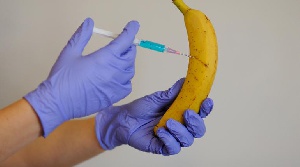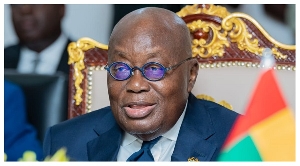Regional News of Thursday, 28 August 2014
Source: GNA
Farmers schooled on GMOs
A day’s sensitization workshop has been held for stakeholders and some farmers’ groups in the Northern Region to help promote understanding of biotechnology as fuel to support economic growth, improve food security and address climate change.
It was also to improve communication, jointly review and discuss biotech policies and regulation and develop key relationships among the agriculture stakeholders to remove the myth surrounding the Genetically Modified Organizations (GMOs).
The workshop, which took place at Nyankpala, was organized by the Savanna Agricultural Research Institute of the Council for Scientific and Industrial Research (CSIR-SARI) in collaboration with the US embassy in Accra.
Dr Stephen Kwasi Nutsugah, the Director of CSIR-SARI, said sustained interaction with stakeholders would help to instill trust in research activities of scientists which would consequently make the final products acceptable to the consumers and the public at large.
GMOs are formed when genes (hereditary materials) are moved artificially from one species to another, which produces improved varieties.
Government has put in place the necessary legal framework and administrative procedures in the form of enacting the Biosafety Act as well as establishing the National Biosafety Commission to regulate the production of GMOs in the country.
However, anti-GMO activists have kicked against efforts to introduce as well as produce GMOs and biotech products in the country citing socio-economic and health concerns of such foods and products.
Dr Nutsugah said those campaigning against GMOs in the country were “acting in ignorance or do not have basis to their criticisms” stating that GMOs offered immense benefits to farmers and the country.
Professor Walter Alhassan, a former Director General of CSIR, called on government to develop the implementing legislation for the Biosafety Act, and set up the Administration for the National Biosafety Commission to guide the biotechnology sector.
Professor Alhassan, who is also a member of the Programme for Biosafety System – Ghana, called for increased awareness on GMOs and biotechnology at all levels to enable the citizenry to fully appreciate the issues and make their own judgements.
Mr John Baptist Kamba, a member of the Suhuduo Farmers Association, expressed readiness to embrace GMOs and biotechnology tools in agricultural production because they were safe and would improve incomes and health of farmers.
Mr Zakaria Issah Nabila, Executive Secretary of Multi Stakeholders Rice Platform at Savelugu/Nanton Municipality, said any technology which could prevent pests from attacking crops was welcome and therefore expressed readiness to adopt GMOs.











